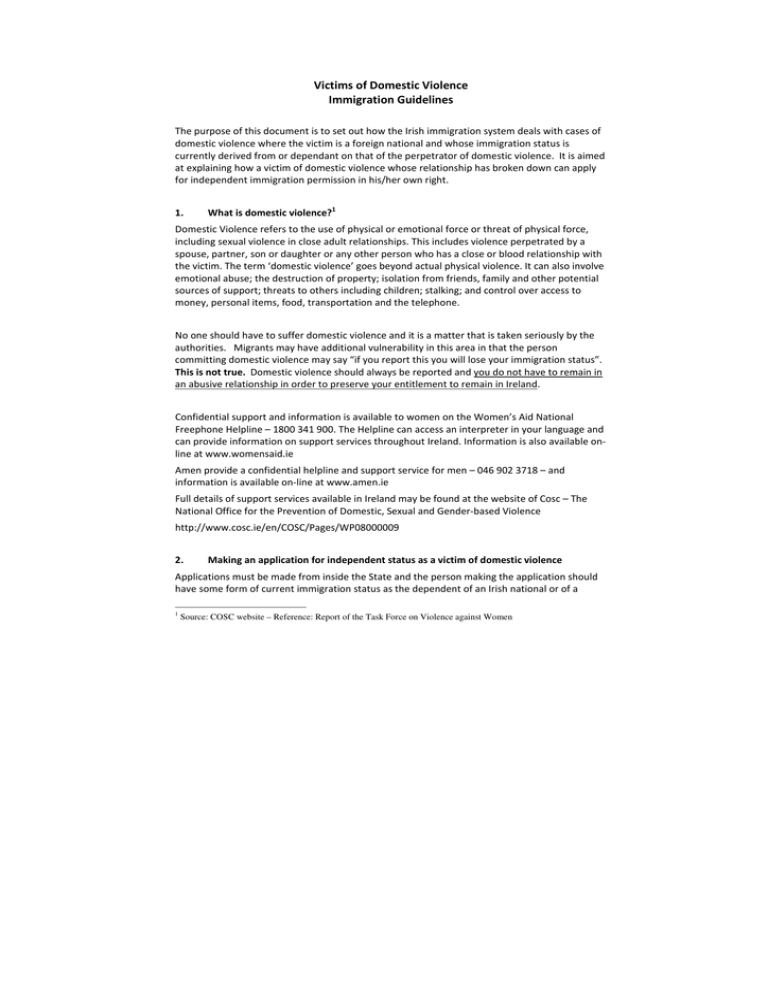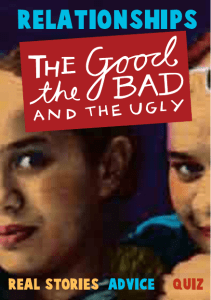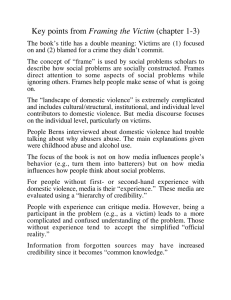
Victims of Domestic Violence
Immigration Guidelines
The purpose of this document is to set out how the Irish immigration system deals with cases of
domestic violence where the victim is a foreign national and whose immigration status is
currently derived from or dependant on that of the perpetrator of domestic violence. It is aimed
at explaining how a victim of domestic violence whose relationship has broken down can apply
for independent immigration permission in his/her own right.
1.
What is domestic violence?1
Domestic Violence refers to the use of physical or emotional force or threat of physical force,
including sexual violence in close adult relationships. This includes violence perpetrated by a
spouse, partner, son or daughter or any other person who has a close or blood relationship with
the victim. The term ‘domestic violence’ goes beyond actual physical violence. It can also involve
emotional abuse; the destruction of property; isolation from friends, family and other potential
sources of support; threats to others including children; stalking; and control over access to
money, personal items, food, transportation and the telephone.
No one should have to suffer domestic violence and it is a matter that is taken seriously by the
authorities. Migrants may have additional vulnerability in this area in that the person
committing domestic violence may say “if you report this you will lose your immigration status”.
This is not true. Domestic violence should always be reported and you do not have to remain in
an abusive relationship in order to preserve your entitlement to remain in Ireland.
Confidential support and information is available to women on the Women’s Aid National
Freephone Helpline – 1800 341 900. The Helpline can access an interpreter in your language and
can provide information on support services throughout Ireland. Information is also available online at www.womensaid.ie
Amen provide a confidential helpline and support service for men – 046 902 3718 – and
information is available on-line at www.amen.ie
Full details of support services available in Ireland may be found at the website of Cosc – The
National Office for the Prevention of Domestic, Sexual and Gender-based Violence
http://www.cosc.ie/en/COSC/Pages/WP08000009
2.
Making an application for independent status as a victim of domestic violence
Applications must be made from inside the State and the person making the application should
have some form of current immigration status as the dependent of an Irish national or of a
1
Source: COSC website – Reference: Report of the Task Force on Violence against Women
foreign national who has immigration permission to live in Ireland. If their immigration status
has lapsed an application can still be made but it will have to be clearly explained in the
application as to the circumstances in which the permission was not renewed.
Applications should be made in writing to General Immigration Division, 13/14 Burgh Quay,
Dublin 2. There is no application fee. In the event of the application being successful the
normal registration fee will be applied.
The application, which can be made through a solicitor or directly by the person themselves
should set out details of the domestic violence suffered and make a request for independent
immigration status. Any relevant family circumstances, especially whether there are any
children involved should be disclosed, including information on whether the applicant or the
perpetrator has left the family home.
3.
Evidence to support application
In order that INIS can fully consider your application for independent status under this policy, it
will be necessary to supply as much information as possible in support of your claim that you are
a victim of domestic violence. The sort of documents that would be helpful in establishing this
would include (original documents required)
Protection Order, Safety Order or Barring Order from the Courts
Medical reports indicating injuries consistent with domestic violence. Details of doctor
and dates of consultation should be supplied
A Garda report of incidents of domestic violence
A letter from a State body (such as the Health Service Executive) indicating that it is
dealing with your case as an issue of domestic violence
A letter of support from a domestic violence support organisation
Any other evidence indicating that you are the victim of domestic violence.
4.
Immigration Categories for Victims of Domestic Violence
Generally the immigration status granted would be at the same level as that which was
previously held as a dependent (normally Stamp 3). The main difference is that this status is no
longer dependent on the spouse or partner and that person will have no say in whether the
applicant is permitted to stay in Ireland. Where it becomes necessary for the victim to work to
support themselves or family members lawfully residing in the State, consideration will be given
to granting permission to work.
All decisions are at the Minister’s discretion.
5.
Cases where the victim is unlawfully present in the State.
This policy is aimed at providing the possibility for lawfully resident victims of domestic violence
to obtain immigration status independent of the perpetrator. The arrangements outlined above
do not apply where the victim is unlawfully present.
However domestic violence should always be reported to the Garda Síochána who will
investigate the complaints and evidence of the domestic violence can be presented for
consideration in any immigration determination including a leave to remain application made on
foot of a notification to deport.
A person who is being subject to domestic violence may apply to the courts for an order under
the Domestic Violence Act 1996. The Legal Aid Board and domestic violence support services will
advise on whether a person is eligible to apply but immigration status is not considered in
relation to such an application,
6.
Perpetrators of Domestic Violence
One of the standard conditions of a foreign national’s immigration permission is that the holder shall
be of good character. Engaging in domestic violence can be regarded as breaching this condition and
this could lead to revocation or non-renewal of the of the perpetrator’s own immigration status.
Notes
1.
The provisions contained in the European Communities (Free Movement of Persons) ( No. 2)
Regulations 2006 (S.I. No. 656 of 2006) in respect of victims of domestic violence in the event
of divorce or annulment of marriage are not affected by this document. Persons who hold an
EU Fam card by virtue of being a spouse partner or other family member of an EU national
exercising rights of Free Movement may may in some circumstances retain their rights of
residence following divorce or annulment.
2.
These provisions relate only to immigration status. Any issues relating to entitlement to state
services remain matters for individual Government Department or service provider.


